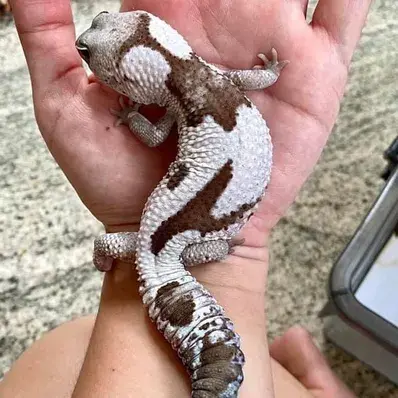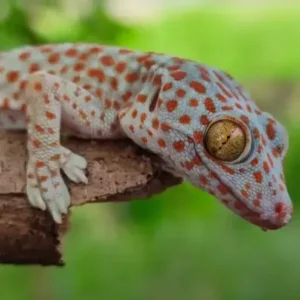Origin of the African Fat-tailed Gecko
The African Fat-tailed Gecko originates from the diverse landscapes of West Africa. Native to regions spreading from Senegal to Cameroon, these geckos have adapted to a variety of environments over the years.
African Fat-tailed Geckos first made their way into the realm of reptile enthusiasts and pet keepers in the latter half of the 20th century. Their captivating appearance, docile nature, and relatively manageable care requirements quickly endeared them to hobbyists and breeders alike.
Personality
Known for their docile and calm nature, African Fat-tailed Geckos make excellent pets. They are generally more relaxed compared to some other gecko species, making them suitable for both novice and experienced reptile enthusiasts. However, fat-tailed geckos are nocturnal animals and are most active at night.
Physical Appearance
The African Fat-tailed Gecko is a medium-sized reptile known for its distinctive fat tail, intricate patterns of brown hues, and a compact build.
- Size
African Fat-tailed Geckos typically reach a length of 8 to 10 inches, making them a medium-sized gecko species.
- Coat Color
Their coloration ranges from shades of brown, often displaying intricate patterns and markings on their bodies and tails. Some of them may have a white stripe throughout their body.
Gender Differences
Female fat-tailed geckos are slightly smaller than the males. However, in terms of temperament or behavior, they are not very different. That is why differentiating between the males and females is not only difficult for the untrained, but it is also unnecessary when seeking them as pets.
Feed/Nutrition
African Fat-tailed Geckos are insectivores, primarily consuming a diet of crickets, mealworms, waxworms, and occasionally pinkie mice. As insectivores, their diet primarily consists of live prey items. It’s crucial to provide a well-balanced diet with proper supplementation of calcium and vitamins to ensure their optimal health.
- Insects: Offer gut-loaded crickets as a staple part of their diet. Gut-loading involves feeding the crickets a nutritious diet before offering them to your gecko, ensuring they pass on essential nutrients. Another excellent source of protein are the mealworms. Moreover, you should offer Dubia Roaches, which are a nutritious option that promotes healthy growth.
- Calcium: Dust the insects with calcium powder before feeding. This is crucial for bone health and preventing metabolic bone disease.
- Water Intake: African Fat-tailed Geckos obtain water not only from their food but also by licking surfaces. Regular misting of their enclosure helps maintain hydration.
- Avoid Feeding Concerns: Overfeeding: Be mindful of portion sizes to prevent obesity, a common issue in captive reptiles. Introduce dietary variety but avoid sudden changes, as geckos may be sensitive to new food items.
Health
African Fat-tailed Geckos, when provided with proper care, are usually healthy and strong. However, understanding potential health issues and proactive measures are vital for ensuring the well-being of these captivating reptiles.
- Respiratory Health: Wheezing, open-mouth breathing, or visible mucus around the nose may indicate respiratory issues. Maintain the appropriate humidity levels in their enclosure, and ensure proper ventilation to prevent respiratory infections.
- Shedding Concerns: African Fat-tailed Geckos shed their skin regularly. Ensure a humid hide in the enclosure to facilitate the shedding process. If your gecko has difficulty shedding, a warm soak and gentle assistance in removing retained shed may be necessary.
- Metabolic Bone Disease (MBD): Inadequate calcium intake or improper UVB lighting can lead to MBD, causing deformities and weakness. Provide a calcium supplement, ensure proper UVB lighting, and maintain a diet rich in essential nutrients.
- Tail Injuries: As a defense mechanism, African Fat-tailed Geckos can often break away their tails. While this is natural, it’s crucial to address the underlying stressor. Minimize disturbances and handle your gecko gently to reduce stress and minimize the likelihood of tail dropping.
- Parasites: Symptoms such as Diarrhea, weight loss, or lethargy may indicate parasitic infections. Quarantine new additions to the enclosure and ensure a clean environment to minimize the risk of parasites.
- Brumation: African Fat-tailed Geckos may undergo a period of brumation (similar to hibernation). This is a normal behavior, especially during cooler months. Keep an eye on their activity levels during brumation, ensuring they have access to water.
Care and Grooming
The fat-tailed gecko care involves the following considerations:
- Temperature Regulation: Fat-tailed geckos require proper temperature gradients within the enclosure is crucial for digestion, metabolism, and overall health. Provide a basking spot with a temperature range of 88-92°F (31-33°C) and a cooler area around 75-80°F (24-27°C). This helps them regulate their body temperature.
- Veterinary Care: Regular Check-ups: Schedule routine visits to a reptile-experienced veterinarian for health assessments and preventive care.
- Diagnostic Testing: In case of any abnormalities or concerns, diagnostics such as fecal examinations may be recommended.
- Breathing Problems: Due to their short snouts, African Fat-tailed Geckos may be prone to respiratory issues, especially if kept in environments with poor air circulation. Watch for signs of labored breathing and seek veterinary attention if respiratory problems are suspected.
Rescue Groups
If you’re considering adopting an African Fat-tailed Gecko, check with reptile rescue groups or reptile-specific organizations. They may have geckos in need of a loving home.
African Fat-tailed Gecko for Sale
Reputable breeders and pet stores specializing in reptiles often have African Fat-tailed Geckos for sale. Ensure the breeder follows ethical practices and prioritizes the health and well-being of the geckos.
Interesting Facts
- African Fat-tailed Geckos are known for their distinctive vocalizations, which include soft chirping sounds.
- Their fat tails serve as a reserve for storing nutrients, providing them with a survival advantage in the wild.
- These geckos are masters of camouflage, using their coloration and patterns to blend seamlessly into their surroundings.
Best For
Ideal for reptile enthusiasts looking for a captivating and low-maintenance pet with a unique appearance.
Top Names
| Male Fat-tailed Gecko Names | Female Fat-tailed Gecko Names |
| Zane | Liz |
| Dragon | Gecky |
| Fire | Lisa |
| Sable | Juno |
| Thor | Cleo |









